| malari route notes | kukina khal→
Prologue
We had promised Winifred we would visit her in Australia, but as India happens to be on the way there, we thought we’d drop in for a spot of cycling.
We weren’t quite sure what to do but we fancied starting a ride where we finished the Garhwal tour, namely at Josimath. I had a hankering to revisit, as I had unfinished business there. The last time, we had passed through rather quickly around the time of Diwali; the town was full of sweets and I hadn’t had time to try them all. As for actual cycling, that last time we had met Bill Weir on the way down from Badrinath and he had continued on up to Malari. Even though Bill had taken a photo of us wearing two hats each, and published it on the web, we still trusted his judgement. Malari is enticingly just off the Nest and Wings map, doesn’t even get onto Google Earth, and in fact nobody has ever been there except Bill. So we thought we would go there too.
Bill had continued on through Kumaon, following what roads were available skirting the Nanda Devi massif. This seemed as good a scheme as any but to copy Bill’s route exactly was too obvious plagiarism. Colin set upon maps to see if there was anything Bill had missed, to find some almost-connecting roads, such as the way over the Kukina Khal. Such almost-roads are classic RSF stuff, but we have found it is easier with mule assitance than pushing the whole lot yourself – we are not purists and we don’t care. In webseaching for a solution to the muley logistics we found an even more unroady excursion to do – the Pindari Glacier. Mike McLean, Kerala mountain biking, runs a 2-week trip of delicious offroad treats in Kumaon, of which the highlight is the ride up and down to the Pindari Glacier.
We emailed Mike. He was somewhat concerned about our low-tech (cheap) bikes but we said we didn’t mind pushing, and so he organised the Kukina crossing and Pindari trek for us with his local agent, Pankaj.
To Malari and back again
Out from Josimath the road strikes up the valley, climbing out through army camps, then in a magnificent Himalayan valley; intricately terraced slopes, brightly painted village houses, tremendous side valleys penetrating the mountain massifs, glimpses of snowpeaks above the forests and through the clouds. We had so little information about the terrain that every bend was guaranteed to reveal new unexpected views. Now the valley narrows and the road creeps along etched below a huge black cliff; now it widens and we see villages inaccessibly high above us. It was beautiful ride, but tough, and what felt like a big climb to our now jellified legs in the last few kilometres, a narrow and spectaular vertiginous ride cut into a sheer rockface.
We dropped over a ridge to a wider basin where Malari is strung out, commanding a ridge. Unlike the villages lower down which are increasingly concrete these days, it is in a remarkably consistently traditional style – the houses rustic but handsomely built from drystones and horizontal tiers of wood, roofed with massive wooden slabs weathered grey and deeply lined, and with wooden balconies and doorframes finely carved with vines, flowing waves and zigzags.
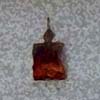
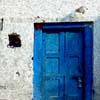
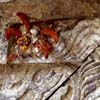
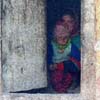
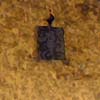
|
The only eaterie was the dhaba in the village centre. Now that the light was gone from the sky, it was freezing on the benches outside and we installed ourselves in the interior which seemed to be where the food was happening. The inside was mostly a shop that sold sweets and biscuits and other unidentifiable dusty packets. There was a narrow bench to sit on, and a small candle by way of light. A chatty local tried to engage us in conversation but we couldn’t make head nor tail of what he was saying; we did grasp however that there was hooch in a grubby bottle; we politely declined his offer of a share, using altitude as an excuse. More to our taste, dhal and an infinite supply of chapattis materialised. Later, the policeman didn’t.
The next day started brighter but clouds collected on the way to Josimath and we were drenched in the last half hour. The weather stuck in a slightly dismal rut for the next couple of days but we didn’t have that much to do. We had expected to take two days to get to Malari and found ourselves comfortably a day up schedule. We stopped for a couple of nights in a place a few km outside Karanprayag.
It was relaxing not having to do very much, but doing nothing properly needs brighter weather and (in my opinion at least) doing nothing needs more comfortable surroundings, for example a luxury resort in Mauritius. I made Colin promise to go to Mauritius next year and then made a survey of the wildlife of the room but wasn’t convinced I’d seen it all. At least the doing nothing was relaxing, until the phone made a noise. It had received a text, from Mike. Mike was wondering where we were in Ghat. We were not in Ghat. We we didn’t think we were due in Ghat until tomorrow, but we were wrong. We would have to make a rather early start. Conveniently an alarm clock in the shape of a bus full of pilgrims wheezed in front of the hotel.